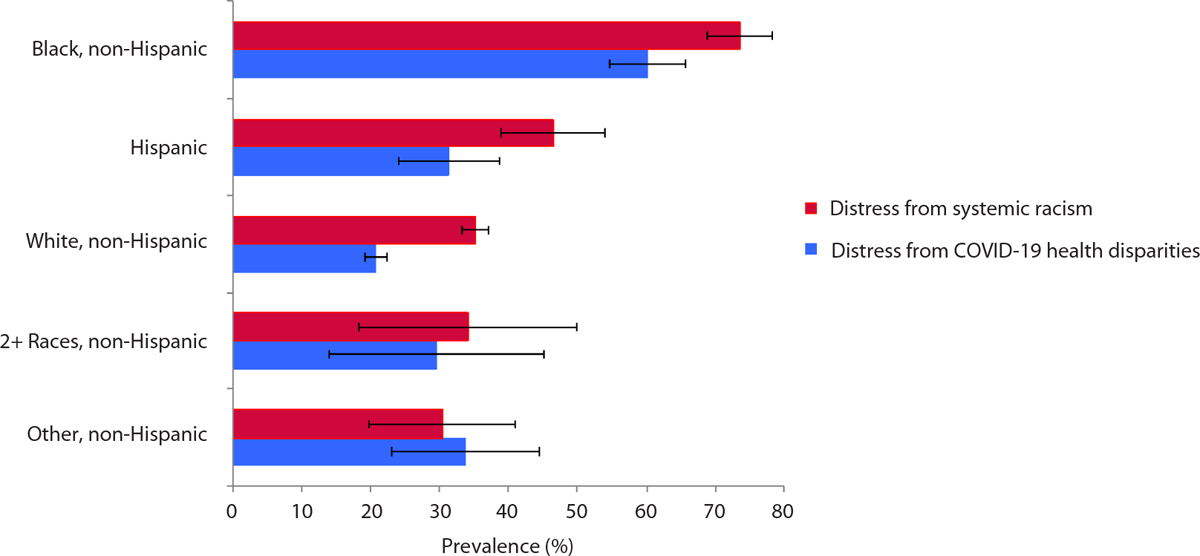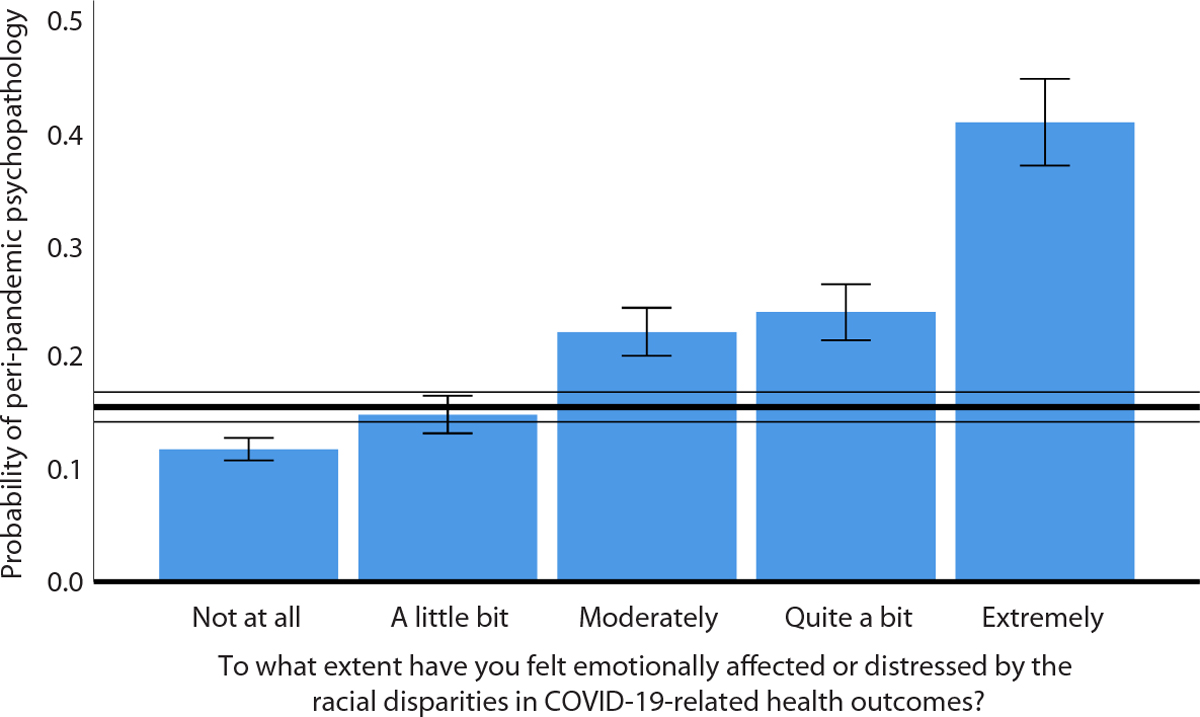Successive waves of coronavirus disease 2019 (COVID-19) infection have disproportionately clustered in minority communities, creating a syndemic of inequities.1 The impact of the pandemic is further exacerbated by poor access to health care and unequal distribution of vaccines2 within the historical and ongoing context of systemic racism, highlighted by the murder of George Floyd in May 2020 and other structural inequities.
While numerous studies have reported an increase in the prevalence of psychiatric symptoms during the pandemic,3,4 no known study has examined the prevalence and mental health impact of distress emanating from the intersection of systemic racism and the COVID-19 pandemic. In this study, we analyzed data from a national sample of US veterans to examine (1) the prevalence of perceived systemic racism and racial disparities in COVID-19–related health outcomes and (2) association of racism-related distress with internalizing (ie, positive screen for major depressive, posttraumatic stress, and/or generalized anxiety disorders) and externalizing (ie, positive screen for alcohol and/or drug use disorders) psychopathology and suicidal ideation (SI) during the pandemic.
Methods
A nationally representative sample of US veterans participated in the National Health and Resilience in Veterans Study; 4,069 veterans completed a baseline survey from November 18, 2019, to March 8, 2020, and 3,078 veterans (75.6%) completed a 1-year follow-up from November 9, 2020, to December 19, 2020.
At Wave 2, the following 2 questions were asked to assess distress related to systemic racism and COVID-19 health disparities: “To what extent have you felt emotionally affected or distressed by systemic racism highlighted by recent events across the country?” and “To what extent have you felt emotionally affected or distressed by the racial disparities in COVID-19–related health outcomes?” Both items were rated on a 5-point scale from “not at all” to “extremely.” A score of 3 (“moderately”) or above was operationalized as a positive endorsement for both items (see Supplementary Methods).
Multivariable logistic regression analyses using the Enter method were conducted to examine the relation between emotional distress and peri-pandemic psychopathology and SI, adjusting for a broad range of theoretically and empirically supported backgrounds, and pre- and peri-pandemic variables associated with these outcomes (see Supplementary Table 1).
Results
A total of 1,309 (39.6%) and 848 (25.9%) veterans reported feeling emotionally distressed by systemic racism and racial disparities in COVID-19–related health outcomes, respectively; 788 veterans (23.8%) endorsed both items. These prevalences were highest among Black veterans—73.5% for systemic racism and 60.2% for racial disparities in COVID-19–related health outcomes (Figure 1).
Figure 1. Prevalence of Distress From Systemic Racism and COVID-19 Health Disparities in US Veterans by Race/Ethinicitya.

aError bars represent 5% confidence intervals. Race/ethnic distribution of the sample: N = 2,541 (weighted 78.2%) White, non-Hispanic; N = 212 (weighted 11.5%) Black, non-Hispanic; N = 216 (weighted 6.2%) Hispanic; N = 40 (weighted 2.8%) other, non-Hispanic; and N = 69 (weighted 1.3%) 2+ races, non-Hispanic.
Multivariable analyses revealed that distress related to systemic racism was independently associated with externalizing psychopathology (ie, positive screen for alcohol and/or drug use disorders; OR = 1.17, 95% CI = 1.03–1.33; Supplementary Figure 1, Supplementary Table 1) and peri-pandemic SI (OR = 1.29, 95% CI = 1.07–1.55 Supplementary Figure 2, Supplementary Table 1) and that distress related to racial disparities in COVID-19 health outcomes was independently associated with peri-pandemic internalizing psychopathology (ie, positive screen for major depressive, posttraumatic stress, and/or generalized anxiety disorders; OR = 1.29, 95% CI = 1.09–1.52; Figure 2, Supplementary Table 1).
Figure 2. Probability of Peri-Pandemic Psychopathology (Positive Screen for MDD,GAD,and/or PTSD)as a Function of Distress Related to Racial Disparities in COVID-19 Health Outcomesa.

aError bars represent 95% confidence interval. Dark horizontal line represents average probability of screening positive for peri-pandemic psychopathology in the full sample, and thin lines around it represent the 95% confidence interval for this value.
Abbreviations: GAD = generalized anxiety disorder, MDD = major depressive disorder, PTSD = posttraumatic stress disorder.
Discussion
We found that nearly 3 of 4 Black US veterans endorsed emotional distress from perceived systemic racism and 3 of 5 from racial disparities in COVID-19–related adverse health outcomes during the pandemic. Further, racism-related distress was independently associated with adverse mental health and SI during the pandemic. Our findings build upon pre-pandemic literature showing that racism is a social determinant of health associated with several mental health outcomes, including SI and substance use.5 Black veterans demonstrated the highest prevalence of racism-related distress, followed by Hispanic veterans, thus suggesting that racially minoritized populations may be more likely to experience greater distress due to racial disparities in COVID-19–related health outcomes, such as the high infection rates and mortality in their communities.2
While this study is limited by its cross-sectional design and use of self-report measures, results nevertheless underscore the high prevalence and psychiatric burden of racism-related distress in the US veteran population. Thus, the assessment of emotional distress related to systemic racism and racial disparities in COVID-19–related health outcomes may be of potential clinical utility for clinicians working with the veteran population. Further research is needed to replicate these results in other general population samples; evaluate mediators and moderators of the relation between racism-related distress and psychopathology and SI; and evaluate the effect of policy initiatives that attend to reducing health care disparities and systemic racism in mitigating adverse psychiatric outcomes in at-risk populations.
Supplementary Material
Funding/support:
Preparation of this report was supported in part by the State of Connecticut, Department of Mental Health and Addiction Services (Dr Jegede) and the US Department of Veterans Affairs National Center for Posttraumatic Stress Disorder (Drs Krystal and Pietrzak).
Role of the sponsor: The funding sources had no role in the design and conduct of the study; collection, management, analysis, and interpretation of the data; preparation, review, or approval of the manuscript; and decision to submit the manuscript for publication.
Footnotes
Disclaimer: This publication does not express the view of the Department of Mental Health and Addiction Services, State of Connecticut, or US Department of Veterans Affairs. The views and opinions expressed are those of the authors.
Supplementary material: Available at Psychiatrist.com.
REFERENCES
- 1.Price-Haywood EG, Burton J, Fort D, et al. Hospitalization and mortality among black patients and white patients with Covid-19. N Engl J Med. 2020;382(26):2534–2543. [DOI] [PMC free article] [PubMed] [Google Scholar]
- 2.Williams N, Tutrow H, Pina P, et al. Assessment of Racial and ethnic disparities in access to COVID-19 vaccination sites in Brooklyn, New York. JAMA Netw Open. 2021;4(6):e2113937. [DOI] [PMC free article] [PubMed] [Google Scholar]
- 3.Reger MA, Stanley IH, Joiner TE. Suicide mortality and coronavirus disease 2019—a perfect storm? JAMA Psychiatry. 2020;77(11):1093–1094. [DOI] [PubMed] [Google Scholar]
- 4.Ettman CK, Abdalla SM, Cohen GH, et al. Prevalence of depression symptoms in US adults before and during the COVID-19 pandemic. JAMA Netw Open. 2020;3(9):e2019686. [DOI] [PMC free article] [PubMed] [Google Scholar]
- 5.Paradies Y, Ben J, Denson N, et al. Racism as a determinant of health: a systematic review and meta-analysis. PLoS One. 2015;10(9):e0138511. [DOI] [PMC free article] [PubMed] [Google Scholar]
Associated Data
This section collects any data citations, data availability statements, or supplementary materials included in this article.


